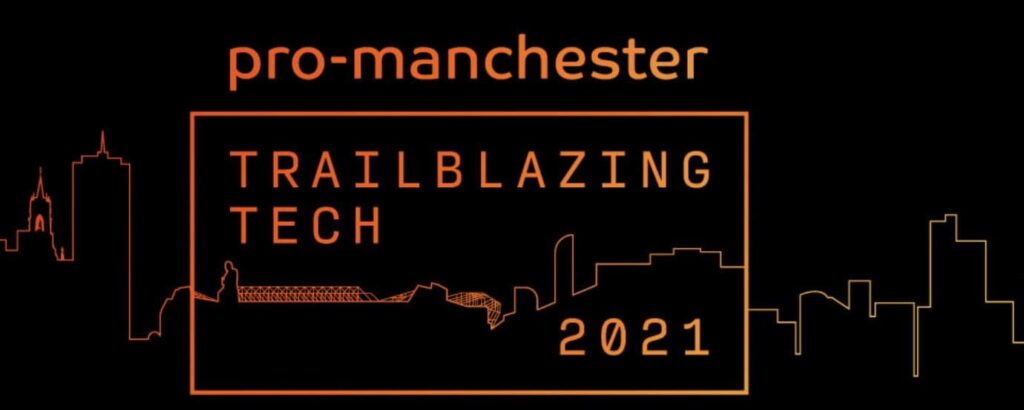Despite a very tough 18 months, the UK’s tech scene is flourishing.
In particular, Manchester is cementing its reputation as the fastest growing tech city in Europe.
According to a report by Tech Nation £527m of venture capital funding poured into tech firms in the city last year, making it second only to London in terms of investment.
Chief executive of pro-manchester Sam Booth said:
“The tech industry has been instrumental in enabling us to progress – providing effective, efficient responses and solutions to many of the challenges we have been presented with.
“Tech has been a key enabler of the UK economy, driving innovation across all sectors.”

Sam Booth, pro-manchester
So, with the world tentatively opening back up it seems like a great time to take stock, find out what the future may hold and which trends emerged from the chaos of 2020.
The Trailblazing Tech Conference 2021 brought together leading experts, including AccessPay, to do just that.
Organised by pro-manchester the one day conference covered everything from the future of retail, health tech, green tech, preventing cyber-crime, the skills agenda to fintech.
Here are 5 key things we learned from going along to the tech conference:

COVID-19 is really leading digital transformation in 2021
This important point was made by several panelists including Hitomi Hamaba from Sony.
It’s not the CEO or even the CTO leading digital transformation right now – it’s the fallout from the pandemic.
Basically, things have changed irreversibly and it’s time for businesses to adapt.
When COVID-19 hit, firms had to become more efficient; they had to find a new way of working with less manpower and this expeditated the use of digital solutions.
Speaking on the impact of the pandemic on financial transformation, in particular, CEO of AccessPay Anish Kapoor said:
“It’s like someone flipped a switch compared to 18 months ago.
“It’s now seen as unacceptable by many corporates to have manual processes in their finance function.
“Businesses have realised they need automation to be more efficient – and banks have realised they are not geared up for it. That’s where we can help them make the transition.”
Elsewhere CIO of retailing giant N Brown Group Adam Warne explained: “As a business we have become more resilient because now we will always remember to look forwards as well.”

Emily Hesketh Deloitte, Daniel Dickinson GC Business Growth Hub, Steve Connor Creative Concern, Jen Johnson Thermatic and Julian Wells of Whitecap Consulting
The green agenda in tech is here to stay?
An increased move towards environmentalism and sustainability has permeated the tech sector, and rightly so.
With big ambitions to be net zero by 2038, 12 years ahead of the national government target, Manchester is at the forefront of a green revolution.
Big questions were asked of the audience by Steve Connor, chief executive of Creative Concern and Greater Manchester LEP board member.
“Do you have a carbon zero plan both personally and for your business? And if not will you take a pledge to start that journey today?”
Elsewhere, Jonatan Pinkse of the Manchester Institute of Innovation Research gave a great presentation on sustainable product design and changing consumer behavior.
As an academic he used the platform to pose some interesting moral questions and concluded: “If I could stress one thing it is to consider what makes your product both functional and exciting.”

Anish Kapoor AccessPay, Mark Robinson Verlingue, David Gardner TLT, Janine Hirt Innovate Finance and Markos Zacharidis of Alliance MBS
Addressing the digital skills gap: the importance of aptitude
Whilst as a nation we are a hotbed of tech innovation we still have a way to go to make sure we’re investing in the right digital skills for the future.
E.g. there will be 3 million new tech jobs created in the UK by 2025 but with changing working practices and a lagging education system are we really ready, or able, to fill them?
This raised some interesting debate including from Geoff Stevenson, regional manager at Ada who spoke of the new National College for Digital Skills opening in Manchester.
Lee Jones digital skills lead for UK Microsoft made a good point in that: “Ultimately digital skills, AI, etc, on their own will not be successful. They have to be combined with higher cognitive skills.”
Most panel members agreed that tech hiring managers look for the right aptitude as well as the specific skills to do the job.
AccessPay boss Anish Kapoor added: “We are now realising that we need to train a whole new generation of people who can do this digitalisation piece and operate the solution we offer.
“But it’s also about candidates having the right mentality and being willing to learn.”

Bricks v clicks – technology and the future of retail ?
One sector which really felt the burden of national lockdowns was retail.
The already ailing high street was deserted for months with many shops now struggling to find their place in a digital world.
While it is true that tech has helped many to embrace e-commerce and create an online footprint, what role does it have to play the other way in tempting people back to town centres?
Dr Timothy Jung, Founder and Director of the Creative AR & VR Hub, at Manchester Metropolitan University noted that “retailers who use technology make 3x more sales than those who don’t – and that was before the pandemic.”
To make it worthwhile to go back into store, retailers need to make their proposition as attractive as possible.

Diane Wehrle, marketing and insights director at Springboard Research advised: “Delivering an outstanding service and hiring the best staff are key elements of old fashioned retailing which we have lost in the last 20 years.
“However, it is also now about interaction and engagement which technology can play a part in. Retailers need to focus on everything that customers can get in-store which they can’t online.”
The experts agreed that a blended approach to shopping post-Covid is the most likely outcome with the public buying online for instant transactions but enjoying a more experiential approach in-store.
Co-founder of MID Communications Danny Simpson, who chaired the discussion, coined a new term for what is needed…’retail-tainment.’
“Pick your retailers and put them under pressure to provide those experiences we now look for.”

Hybrid events are a thing and they work surprisingly well
Finally, a tech conference wouldn’t be very authentic without incorporating a bit of computer wizardry of its own.
Trailblazing Tech 2021 made the ‘hybrid’ approach look seamless with a mix of on-stage panelists and fellow speakers linking in via video chat.
In-person spectators were joined by an entirely virtual audience who watched the conference online.
And the entire agenda, speakers and attendee lists were accessible via a QR code with the audience submitting questions virtually through an app.
Without Covid-19 and the normalization of working from home this approach would likely never have happened but it opens up the conversation to a global audience – which you have to admit is an exciting proposition.
Sam added: “This is our first hybrid event and it really shows just how far we have come in the last 12 months.”
